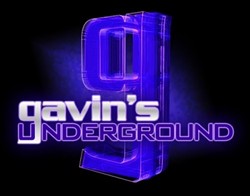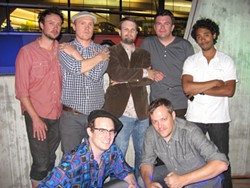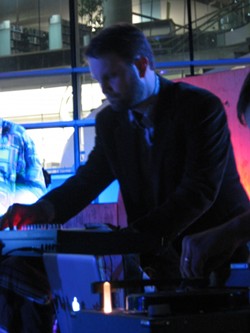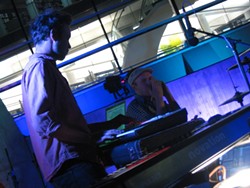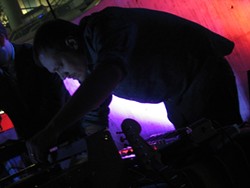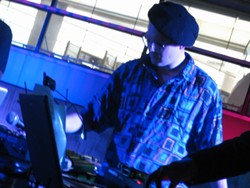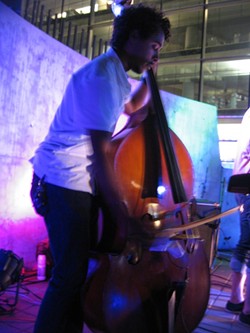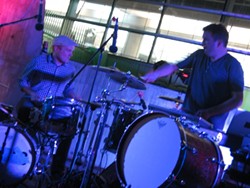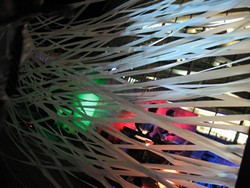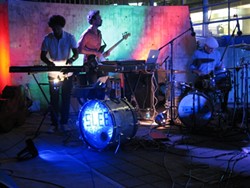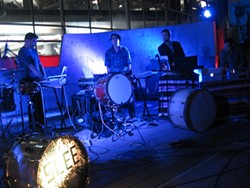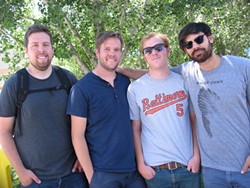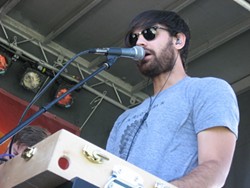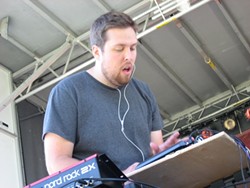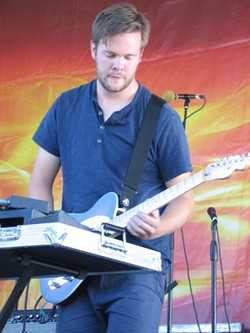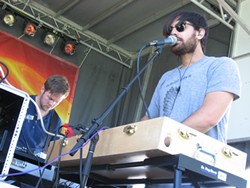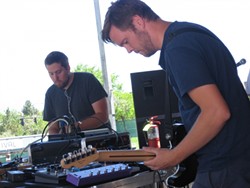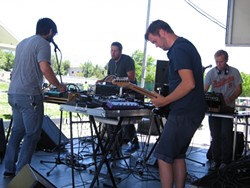Tuesday, June 25, 2013
Salt Lake Electric Ensemble, Polytype
Posted By Gavin Sheehan on June 25, 2013, 11:59 PM
No, your eyes don't deceive you; if you were at the 8 p.m. show on Saturday, you could see me snapping photos as I was tied by the waist to the roof with seven knots. But, that's a story to ask me if you ever see me in person. As every year, I pick some performing musicians to interview, and this year we have the tech-savvy orchestra known as the Salt Lake Electric Ensemble and Provo-based electro-rock band Polytype. You can see photos of the entire festival from Day 1, Day 2, Day 3 and Day 4 (including what I've been told are the only press photos of that performance taken from the roof) by clicking those links.
Salt Lake Electric Ensemble
Gavin: Hey, Matt. First off, tell us a little about yourselves.
Matt: We first started playing music together four years ago. The initial rehearsals led to several performances and a recording of Terry Riley's fabulously psychedelic 1964 score In C. Lately, we've been engaged in writing, improvising, and performing original music together. Our current lineup includes Matt Dixon, Ryan Fedor, Ron Harrell, Charlie Lewis, Oliver Lewis, Greg Midgley, and Dan Thomas.
Gavin: What got you interested in music, and who were some of your favorite acts and musical influences growing up?
Matt: I grew up around music and just naturally gravitated toward it. I doubt I could ever explain why; it was always a natural fit for me. There has been a lot of music that has influenced me in one way or another, but the important ones have been Radiohead, Boards Of Canada, Stars Of The Lid and the American Minimalist composers (especially early Steve Reich, LaMonte Young and Terry Riley). Lately, I've been enthralled by Mozart and by Indian classical music.
Gavin: When did the idea come about to start up a group like this, and where did the name come from?
Matt: The idea came about in the summer of 2009. I had just finished my first year as a public-school teacher and wanted to spend my summer vacation making music. I had long been interested in the intersection of music and technology, and was listening to a lot of minimalism at the time. With those things rattling around in my head, I realized that Terry Riley's "In C" would be a perfect piece of music to transfer to MIDI and sequence with live performers. That's how it began. The group's name came from us all loving SLC and wanting to say it loud and proud.
Gavin: Most everyone in the band is involved with the music scene in some way. What was it like bringing the group together and forming the lineup you have?
Matt: The group came together in a very organic way. Prior to forming the group, Greg and Charlie were the only two guys I knew well. After the initial rehearsals ended up being interesting, word spread and people joined up. The lineup has always been pretty fluid and has changed several times over the years.
Gavin: What was the process like putting together songs with a live computer setup and little instrumentation?
Matt: Computers are a double-edged sword. In one sense, they make music-making interesting by providing a wealth of different sounds to choose from and by offering endless sound-shaping possibilities in one compact package. For our new set, we've actually switched over to a performance environment, where everyone is playing a traditional instrument, usually fed through a computer and processed in some way. For example, some of us perform with just a laptop and a piano MIDI controller, and this setup allows us to load the entire set onto one screen and to switch between instrument sounds at the touch of a button. Ryan Fedor plays an electric guitar through his laptops and processes the sound in real time. Greg, on the other hand, has collected and uses all kinds of old electronics in addition to a laptop. On the other hand, the technology can turn on you. Computers crash. The software can be complicated to learn and operate. Sometimes, mysterious problems pop up that are almost impossible to troubleshoot. Once everything is set up and running correctly, though, the process of making music isn't so different from using traditional instruments. We're making the same decisions as everyone else: song structure, sound design, what's going to happen next, etc.
Gavin: What kind of a challenge is it presenting that to a live audience, both keeping in sync with each other and making sure the performance is engaging.
Matt: Creating an engaging live performance is a challenge regardless of the tools used; that being said, an audience tends to have certain expectations when they go to a concert. One of those expectations is that they'll see people playing recognizable musical instruments, and this time we're doing exactly that. We used to perform with only the laptops, and maybe that challenged that particular expectation a little. Whenever possible, we try to add some kind of interesting visual element to our performances.
Gavin: About three years ago, you released your debut album, In C. What was it like putting that album together, and what issues did you deal with along the way?
Matt: "In C" was a wonderful score for us to play as we learned the technology and put it to use, and I think it's a towering achievement of 20th-century composition for the composer, Terry Riley. It's also a blast to play, and creates a unique sense of community among those who play it. Once the lineup of the group stabilized, we just rehearsed it a lot and made a bunch refinements along the way. There were some technical problems that had to be solved, things like synchronizing all of the performers with MIDI clock, and learning the ins and outs of sound-design tools, like synthesizers and samplers. The far-more-challenging aspect was to learn to develop a critical ear and the discipline to use it. "In C" requires, more than anything else, the ability to listen very, very carefully.
Gavin: What did you think of the public reaction to it once it was released?
Matt: The public reaction was terrific and unexpected. We were pretty proud of the work we had done, but having other people pay attention is never a sure thing.
Gavin: Since then, performances have only been occasional. What's kept you at the pace you've had the past couple of years? And have you thought about expanding it to do more shows?
Matt: Because of economic realities, this band is a part-time project for all of us. We've been focused on developing new material lately, and now that we have a full-length set finished, we'll play it as often as we can manage.
Gavin: Are there any plans down the road to record a new album?
Matt: Work on a new album is underway. Stay tuned.
Gavin: What's it like for you to play the Utah Arts Festival and what are your thoughts on the show?
Matt: This is our second Arts Fest, and we absolutely adored the first one. I think it's a fantastic event, and we're honored to be a part of it. We're excited to be working with local visual artist Brian Patterson, who will add another element to the performance.
Gavin: Going local, what are your thoughts on the music scene, both good and bad?
Matt: SLC has a fantastic, underappreciated music scene. Perhaps it's underappreciated because it's all art and no business? That's not necessarily good or bad, but it does ensure that the city will be full of little-known musical gems.
Gavin: Is there anything you believe could be done to make it more prominent?
Matt: It's tough to say. If SLC were a larger town, it would probably be worth it to the music-business establishment to invest more time and money into promoting, recording and touring bands from around here. Since we're small and geographically isolated, we don't get a lot of people from the music business in our town, but in the age of the Internet that's less of a problem now.
Gavin: Not including yourselves, who are your favorite acts in the scene right now?
Matt: Palace Of Buddies and Night Sweats are great, total pros. The classical scene is also very strong right now, with the Utah Symphony sounding incredibly good and chamber organizations like Nova and Utah Chamber Artists providing a steady stream of interesting and impeccably performed concerts.
Gavin: What do you think of file sharing these days, both as musicians and music lovers?
Matt: File sharing can be a great tool, but it also presents nearly insurmountable challenges to folks trying to make a living as musicians. I have no problem with someone downloading a track from an album that's out of print or out of copyright. I wouldn't even get too upset if the copyright had been renewed a bunch of times, because I think copyright law has become too restrictive and that music should be entering the public domain a lot sooner than it is now. I do think it's tough to ethically justify downloading music from the vast majority of current musicians, simply because we live in a capitalist society and most of these folks are struggling to make a living, or even minimum wage, with their music. Instead, why not discover new music with Spotify or Mog, and if you like the music, help the musicians out by buying it! That simple, small act will help new music to be made. That being said, free music is the new reality, so musicians need to innovate to make a living. I think this has resulted in a new golden age. Vast amounts of interesting new music are being produced all the time.
Gavin: What can we expect from all of you over the rest of this year?
Matt: We're planning a few performances, and after that we're going to go back to work on recording the next album.
Gavin: Is there anything you'd like to plug or promote?
Matt: I'd like to plug those shows I just mentioned, but I'm not sure if we have the dates nailed down.
Polytype
Gavin: Hey, everyone! First thing, tell us a little about yourselves.
Jason: I'm Jason Gibby. I play samplers and synths.
Scott: My name is Scott, and I like to party.
Jared: I'm Jared, and I tend to forget things.
Mason: I'm Mason. My favorite food is pizza. Second favorite is french fries.
Gavin: What got you interested in music, and who were some of your favorite acts and musical influences growing up?
Mason: I listened to a lot of pop and R&B music as a kid. My mom's side of the family is very musical, and she was always playing music around the house -- Luther Vandross, Peabo Bryson, George Benson, that kind of stuff. Her side of the family is Samoan, so our get-togethers always involved some type of singing. When I was in junior high, my dad got me into The Cars and some other '80s bands, like The English Beat, Madness and UB40. My junior year of high school, like 2004, Gibby and I played in a band that opened for Menomena at Kilby Court. Our band sucked, but the Menomena guys were super nice to us. I bought their album -- their first one, I Am The Fun Blame Monster -- and that got me into more experimental music. Gibby introduced me to Radiohead around the same time and I think that was when I really fell in love with music.
Jason: I exclusively listened to the Beatles and Weird Al until I was 11. When I started playing instruments, I got into jazz. Now, I like everything.
Scott: Refused, At The Drive In, and Thrice were the most influential groups in my teens. They drove me to take interest in playing music.
Jared: I had always been interested in music, but it was never really a main focus of mine until I listened to Sgt. Pepper's. That was the first album that floored me at a young age and opened the floodgates to an obsession. It expanded from there, and I tried my best to ingest every sound that came my way.
Gavin: How did you all come together to form Soft Science?
Scott: I met Mason after seeing him play at Fork Fest in 2010. Prior to that, I was doing a solo ambient project and moving toward doing electronic music.
Mason: It was kind of fortuitous, actually. Scott saw me play that one day, and the next day we found out we lived around the corner from each other. I went to his house to jam a couple of times and we got Jared over to play bass. Jared and Gibby had been playing in the last project I was in, called Dandy Lyon. Gibby and I have been playing music together since high school, and I have a really hard time doing any project without him. He's super-talented, so any time I've been in a new project I always think, "Gibby would have some really good ideas for this." He wasn't involved with Soft Science for the first couple of months, but I really wanted him to be; I just didn't know if he was into the music. I think he saw us play a show at Muse Music one time and we talked after about him joining in. It took some getting used to, for sure, because we basically had a band of three guitar players -- Scott, Gibby and me -- one bassist and no drummer. We started programming our beats -- and they sucked -- and slowly each of us shifted into the roles we now have in the band.
Gavin: What was it like for you as a group discovering your sound and coming up with something electronic that didn't sound overproduced?
Jason: It was hard but also a blast. Discovering yourself in unknown territory really shows what you're capable of.
Scott: I'm actually not sure we've discovered our sound yet, but we have definitely found a flow in our writing process. I think the next album we will be better able to say we have a sound. Basic//Complex is the culmination of two years of trying to find our niche.
Mason: It was a growing process, for sure, and it continues to be. We always have to give credit to Nate Pyfer, who produced our first record, though. We had no clue what we were doing and he really gave us the direction we needed. I think he gave me more confidence in making electronic music, actually. Before we started working with Nate, we were actually considering getting a drummer and doing the whole indie-rock thing again. I think it was because we were just unsure of what to do next, with the electronic sound, I mean. Nate was great because he could see the end game and gave us that vision and the confidence to go after it.
Jared: I'd say it was a rough go. Even though we all had a somewhat consistent idea on what we wanted the album to sound like, we still had to work extremely hard to get on the same page. I think the most important thing for us in "finding our sound" was to not over-think and over-process ideas. Oftentimes, we were hesitant in running with an initial, simple idea and we ended up twisting and torquing it to the point where we didn't like it anymore. As the process went on, honing the sound was often a matter of simplifying it.
Gavin: You had a run with the name for a while before having to change it. What caused the change, and where did the name Polytype come from?
Mason: Oh, boy, that was such a headache at the time. Basically, after we had been playing shows for a while as Soft Science, we found out there was a band in Sacramento with the same name. We didn't think they were really active, though, because they didn't really seem to be doing much, so we didn't see a problem in keeping that name. After we released our first song, "Refract," last November, we got a message from one of the guys in bizarro-Soft Science, asking us to change our name because they were planning on putting out another album. We wanted to be nice guys and we also didn't want there to be any confusion about the name, so we decided to change ours. Picking a band name is probably one of the most annoying tasks on the planet. We had to come up with one fast, though, because we were getting ready to put our album out and were e-mailing blogs and stuff, so we set a deadline one day and just started throwing out ideas over a Google Hangout because we were all at work. We had come up with this arbitrary point system for voting on name ideas, and when the deadline came we looked to see what name had the most points. It was Polytype. I think Gibby had come across the term in some math or science literature. I liked it because I felt like it was something we could own in the sense that most people don't know the actual definition of the word, so I felt like our music could be the definition of it for most people. Also, we searched on Google and iTunes and didn't see any other bands named Polytype, so we went for it, haha.
Gavin: You're one of the few Provo bands this year to branch north and hit up shows in SLC and Ogden. What kind of a challenge has it been breaking out beyond Utah County and finding a fan base in other cities?
Scott: The Salt Lake scene has been a tough one to break into. We've been very fortunate to have KRCL play some of our tracks, and we've been put on some good shows through S&S. Hopefully, we can grow our fan base in the area because we love playing Salt Lake.
Jared: Logistics is a huge factor. We're not able to play as much as we would like in these other cities and the turnouts are still small when we are out of our home turf. It's slow going, but growing a fan base requires steady, consistent work on our part and we'll keep on trucking.
Mason: It's always hard to get fans outside your home town, but it's been a lot easier since the album came out. We played some shows at Kilby when we were Soft Science, but we never had an album to give people, so they'd forget about us by the next time we played. We've played some cool shows in Salt Lake lately and, hopefully, we'll start to get the same crowds up this way that we do in Provo.
Gavin: Earlier this year, you released your debut full-length Basic//Complex. What was it like recording that album, and what issues did you deal with along the way?
Jason: The biggest challenge in making an album is believing in the songs for a long period of time while not getting sick of them. It's hard to see it to the end but it pays off.
Jared: For me, it was the most exhausting and rewarding process I have ever been a part of. The album was an enormous learning experience. Learning how to translate the ideas we had in our head into the correct sounds was an incredibly difficult yet immensely fulfilling undertaking.
Mason: Yeah, it was all just a huge learning process. We honestly had four songs when we decided to make a record and we didn't like any of them. There were probably six to seven months of just writing and re-writing. It was such a foreign process to us, so it was really easy to feel self-conscious or overwhelmed at times. Again, Pyfer did a great job of keeping us on track, not just with the music, but the mental aspect of creating a record. It was tough, but worth it.
Gavin: What did you think of the public reaction when it came out and the response from critics?
Scott: So far, it's been very positive. I haven't yet read a negative review, and we've been pretty well-received by the community. It's uplifting to get a positive response when you put so much into something.
Mason: I'm very grateful for the kind remarks about the record. I haven't heard anything really negative about it, so I guess I'm grateful for that, too. I mean, I'm sure there are people who don't like our stuff, but I'm just grateful they keep that opinion to themselves, haha. The sense of validation that comes from somebody complimenting our music, though, means a lot. I might be speaking for myself here, but I get my satisfaction in music from hearing or seeing people respond to it. That relationship between artist and listener is very important to me, so to see a positive reaction to something we've created, that just feels good.
Jared: We've been overwhelmed with the support that has been shown for us. It's a humbling experience, for sure, and we couldn't have been happier with the reaction.
Gavin: In recent month,s you've stepped up your game in promotion, including a music video and high-profile shows. Are you looking to find a label down the road, or are you keeping yourselves independent for now?
Scott: There are so many options these days in music distribution. A label would be great in some respects, but we would love to build ourselves to a point where we can't grow anymore on our own, and where we will have leverage if a label chooses to approach us.
Mason: Yeah, finding a label isn't really at the top of our priorities at all. We're mostly just trying to take care of the things we know we are in control of, like writing more music or figuring out better ways to engage the crowd during a show. All that other stuff will fall into place.
Gavin: Are you guys looking to tour anytime soon, or mainly sticking to Utah for now?
Mason: We're actually heading out on a West Coast tour with our friends Golden Sun -- listen to them! -- in August. I think we'll be announcing the dates soon. We're really looking forward to that. It will be our first time touring, and the dudes in Golden Sun are so talented and really good to be around. It'll be a highlight of the summer for us, for sure.
Jared: We're all of the mindset that branching out is a must. We hope the contacts made on the road in August will expand into future opportunities in other regions.
Gavin: What are your thoughts on playing the Utah Arts Fest this year?
Scott: We're very excited to play for that crowd. The arts community in Utah is very important to us.
Mason: I agree, the arts community, especially in Provo, has always been important to us and has connected us with some of the people who helped make Polytype a reality. I think playing the Utah Arts Fest, for us, is just kind of a nod to the statewide community, that we are happy to be connected to so many people who are passionate about art. We're really looking forward to it.
Gavin: Going local, what are your thoughts on the local music scene, both good and bad?
Jason: I've got nothing but good feeling toward the local music scene. There are tons of talented people around here.
Scott: It's really stacked with talent, and there are people who want to push bands past just local, and to a national and international level. The hardest part about trying to do that in Utah is that we don't have as large of a network as places like L.A., Seattle, or New York. On the flip side, though, there aren't as many bands competing for attention. If you're a hard-working and talented band in Utah, though, you can get noticed.
Mason: I love local music. I've been involved in the Provo music community since I was, like, 14 and it's always been special to me. There are so many talented people who make music here, and maybe equally as important, there are so many people here who love experiencing local music, even if they don't play in a band. Even outside of the traditional Provo venues, like Velour or Muse Music, I know there are lots of super-talented kids playing house shows or making music kind of in the shadows and I love that, too. If you're making music, I'm rooting for you.
Gavin: Is there anything you believe could be done to make it more prominent?
Mason: I don't know about making the scene more prominent on a national level, but I think making it more prominent locally is just as important. There are so many people who have no clue what kind of talent exists right in front of them. Things like Utah Arts Fest or the Rooftop Concert Series in Provo are great ways to get people in the community to realize we have incredible artists right in our backyard.
Scott: Utah has had some solid bands move into the national spotlight over the past few years, which seems to be drawing a lot of positive attention here. I'd like to see more local bands on bigger shows with touring acts, but that may be out of the promoters' hands in most instances.
Gavin: Not including yourselves, who are your favorite acts in the scene right now?
Mason: I really enjoy watching Golden Sun perform; they've got so much energy and they sound great. Scott Shepard is one of the most talented people around and I could listen to him sing all day. I'm really excited for his new project Oceanear. I'm also stoked for Mideau's album to come out later this year. I love what House of Lewis is doing. Lake Island has been a favorite for a long time. The list goes on and on.
Jason: Golden Sun!
Scott: Golden Sun, Oceanar, and Mideau top my list.
Jared: Golden Sun!!!
Gavin: What's your opinion on the current airplay on community radio and how it affects local musicians?
Scott: We've had a lot of airplay on community radio, which I am very grateful for. It's been a huge boost for us in reaching people and it's essential for local musicians.
Mason: Community radio or GTFO, man. I think my favorite show on KRCL is Tuesday Night Takeover with Karamea. She always tries to throw in some good local stuff during her show, plus she plays my kind of music. The high school stations in Utah County like KPGR play some good local music, too. I think it's a great tool to help people realize what kind of talent surrounds us. I remember when I was in high school and I heard a Spencer Russell song on KPGR and then I saw him play at open-mic night in Provo, like the next week, and I was pretty much starstruck, haha.
Gavin: What do you think of file sharing these days, both as musicians and a music lovers?
Jason: When anything is free, immediate, and plentiful it becomes more disposable. But, I think true music lovers will always put high value toward the art form.
Mason: What he said.
Scott: It's a new industry, and musicians have to adapt by finding new sources of revenue. For me, music is an expression, and I find happiness in sharing it, not just profiting off of it. Obviously, I would like to be able to put food on the table with the amount of work I put into music, but if at the end I can say I created something that people enjoy, without having made a penny, I would be satisfied.
Jared: File sharing isn't going anywhere anytime soon, so I think it's just another double-edged sword musicians have to deal with now. Being a successful musician has always entailed finding creative solutions to unique problems. The Internet era is no different in that it has provided limitless opportunities at the cost of significant setbacks. It's here to stay, and we're going to try our best to embrace new technologies, think forward, and work well within the bonds of this aspect of a developing Internet culture.
Gavin: What can we expect from all of you over the rest of this year?
Mason: We're playing a lot of shows between now and the beginning of September. After that, we'll probably slow down on the live shows so we can get to work on another release; we don't expect the next release to take as long as the first one. We've been writing some new songs over the past little while and we're really excited about where our music is headed. Hopefully, toward the end of the summer we'll be playing some of the new songs in our live shows.
Gavin: Is there anything you'd like to plug or promote?
Scott: We've got a rad show at Velour on June 29 with The Brocks, Oceanear and Swimm. We're also playing SLUG Localized on July 12 and we're super-excited for that show. Urban Lounge is a fun venue to play, so we hope we see tons of people there.
| Follow Gavin's Underground: |
On Topic...
-
Film Reviews: New Releases for April 19
The Ministry of Ungentlemanly Warfare, Abigail, The Beast, Hard Miles, Sasquatch Sunset and more
- Apr 19, 2024
-
Film Reviews: New Releases for April 12
Civil War, Escape from Germany, Coup de Chance, Hundreds of Beavers, La Chimera, Sting
- Apr 11, 2024
-
Film Reviews: New Releases for April 5
Monkey Man, The First Omen, Wicked Little Letters, Girls State, Scoop, Exhuma
- Apr 4, 2024
- More Gavin's Underground » More Culture »
More by Gavin Sheehan
-
Gavin's Underground: End Of An Era
Nine and a half years of local entertainment blogging comes to an end.
- May 26, 2017
-
Torris Fairley
A quick interview with the up-and-coming SLC-based comedian.
- May 25, 2017
-
Cirque Asylum
A look into the dance school teaching unique forms of aerial arts.
- May 24, 2017
- More »


